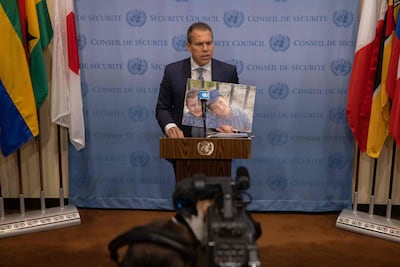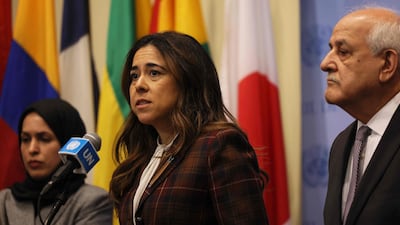The UN Security Council on Monday approved a statement that expressed “dismay” at Israel's plans to legalise settlements on occupied Palestinian territories, and strongly opposed all unilateral measures that “impede peace.”
The Palestinians, working with the UAE, had sought a vote on a legally binding resolution but, facing an almost certain veto from the US and a possible diplomatic crisis, a "presidential statement" was issued instead.
The statement came in response to a February 12 announcement that Israel would legalise nine Jewish settler outposts in the occupied West Bank, which had been built without government approval.
The Security Council repeated that "continuing Israeli settlement activities are dangerously imperilling the viability of the two-state solution based on the 1967 lines".
The council condemned “all acts of violence against civilians, including acts of terrorism".
On settlements, the Security Council said it “strongly opposes all unilateral measures that impede peace including … Israeli construction and expansion of settlements, confiscation of Palestinians’ land, and the 'legalisation' of settlement outposts, demolition of Palestinians’ homes and displacement of Palestinian civilians".
To avoid a diplomatic crisis, the Palestinians agreed to hold off on a vote for a full resolution, a UN diplomat told The National.
And Israel agreed to US demands to suspend unilateral action in the West Bank, including Palestinian house demolitions and new building projects for a few months.
Israeli Prime Minister Benjamin Netanyahu's office said on Monday that Israel would pause authorisation of new settlements in the occupied West Bank for several months.
“Israel notified the US that in the coming months it will not authorise new settlements beyond the nine that have already been approved,” Mr Netanyahu's office said.
Riyad Mansour, the Palestinian ambassador to the UN, said there was “one country” that insisted not to allow a full resolution to be adopted.
“They did not want to use a veto. And I think that the fact that we reached a unanimous agreement on the presidential statement is a very important step in the right direction,” he said.
Anwar Gargash, diplomatic adviser to the UAE president, praised on twitter the adoption of the UN Security Council presidential statement as a “constructive” move in favor of the Palestinian cause with the “positive leadership of the Emirati diplomacy”.
Addressing the Security Council, the UAE’s ambassador to the UN, Lana Nusseibeh, who lead the effort for the Palestinians in the council, said the past few weeks showed the potential consequences of the continued lack of a credible peace process.
Ms Nusseibeh urged the world body not to accept “breakdown” as a sustainable status quo and to “revitalise its role as the international custodian of the two-state solution.”

She also expressed concern that violence could spike again as the Muslim holy month of Ramadan coincides this year with the Jewish Passover holiday and Easter and rejected “all forms of Islamophobia, anti-Semitism and Christianphobia".
For the first time, the Security Council included language expressing concern about "instances of discrimination, intolerance and hate speech motivated by racism or directed against persons belonging to religious communities, in particular cases motivated by Islamophobia, anti-Semitism or Christianophobia.”
Ms Nusseibeh called for the respect of all religious sites, including mosques, churches and synagogues, in light of the alarming rise in extremist hate speech and incitement.
The UN’s Middle East peace envoy, Tor Wennesland, urged both sides to avoid steps that could further inflame the situation and warned of “ominous signs” that await Israelis and Palestinians if they fail to address the current instability.
The US ambassador to the UN, Linda Thomas-Greenfield, told the council the US “strongly opposes" Israel’s announcement that it will advance thousands of settlement units.
And, she added, “we strongly oppose Israel’s announcement that it will begin a process to retroactively legalize nine outposts in the West Bank that were previously illegal under Israeli law."
“These unilateral measures exacerbate tensions. They harm trust between the parties. They undermine the prospects for a negotiated two-state solution. The United States does not support these actions — full stop.”
Ms Thomas-Greenfield said the United States strongly supports the presidential statement, which “demonstrates the Security Council’s unanimous, collective voice on these issues.”
Before the Security Council meeting, Ms Nusseibeh said Monday’s presidential statement represents “the first output from the Security Council in six years on the situation in Palestine".
“I think it has a strong, unified signal from the council that they want to see de-escalation, dialogue and focus on political parameters to a long-standing conflict,” she said.
Ms Nusseibeh commended the role of the US, Palestinians, Israelis and Jordanians who “worked hard in achieving this outcome today".



